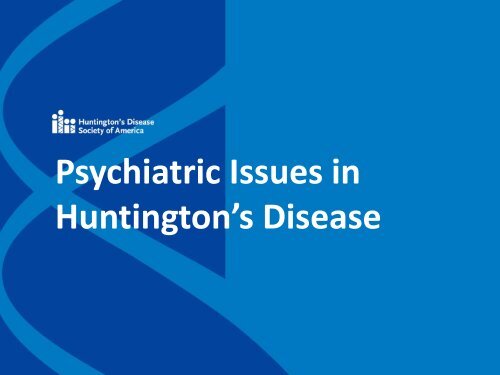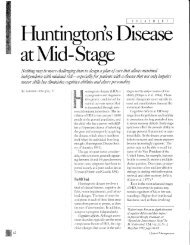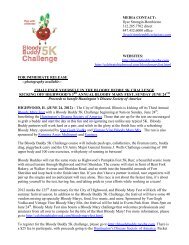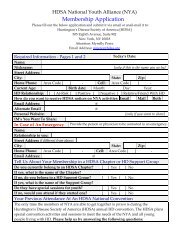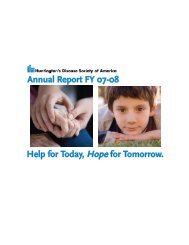Psychiatric Issues in Huntington's Disease
Psychiatric Issues in Huntington's Disease
Psychiatric Issues in Huntington's Disease
Create successful ePaper yourself
Turn your PDF publications into a flip-book with our unique Google optimized e-Paper software.
<strong>Psychiatric</strong> <strong>Issues</strong> <strong>in</strong><br />
Hunt<strong>in</strong>gton’s <strong>Disease</strong>
Arik Johnson, PsyD<br />
HDSA Center of Excellence at UCLA<br />
June 24, 2011<br />
26th Annual HDSA Conference<br />
M<strong>in</strong>neapolis, MN
• The <strong>in</strong>formation provided by speakers <strong>in</strong> workshops, forums,<br />
shar<strong>in</strong>g/network<strong>in</strong>g sessions and any other educational<br />
presentation made as part of the 2011 HDSA convention program<br />
is for <strong>in</strong>formational use only<br />
• HDSA encourages all attendees to consult with their primary care<br />
provider, neurologist or other healthcare provider about any<br />
advice, exercise, medication, treatment, nutritional supplement or<br />
regimen that may have been mentioned as part of any<br />
presentation
Presenter Disclosures<br />
Arik Johnson, PsyD<br />
The follow<strong>in</strong>g personal f<strong>in</strong>ancial relationships with commercial<br />
<strong>in</strong>terests relevant to this presentation existed dur<strong>in</strong>g the past 12<br />
months:<br />
No relationships to disclose
Objectives<br />
• Discuss psychiatric issues that may arise <strong>in</strong> the early stages of<br />
Hunt<strong>in</strong>gton’s <strong>Disease</strong> (HD)<br />
• Discuss ways to identify signs and symptoms of common<br />
psychiatric disorders<br />
• Explore the impact of psychiatric issues <strong>in</strong> the early stages of HD<br />
• Review medications used <strong>in</strong> treat<strong>in</strong>g psychiatric issues<br />
• Provide suggestions for non-medic<strong>in</strong>al cop<strong>in</strong>g strategies for<br />
psychiatric issues
<strong>Psychiatric</strong> <strong>Issues</strong> <strong>in</strong> HD<br />
• <strong>Psychiatric</strong> issues that can be seen <strong>in</strong> early stages of HD<br />
• Depression<br />
• Suicide<br />
• Anxiety disorders<br />
• Apathy<br />
• Irritability and anger<br />
• Psychotic disorders and symptoms can develop over the course of the<br />
disease and <strong>in</strong>clude symptoms like delusions and halluc<strong>in</strong>ations, but tend<br />
to be less common <strong>in</strong> the earlier stages of HD<br />
• <strong>Psychiatric</strong> disorders are treatable<br />
• Psychotic symptoms can be more difficult to treat<br />
• NOTE: the psychiatric issues seen <strong>in</strong> HD can be complicated by<br />
the cognitive issues seen <strong>in</strong> HD
<strong>Psychiatric</strong> <strong>Issues</strong> <strong>in</strong> HD<br />
• Treatment is the same as the typical <strong>in</strong>terventions for all HD<br />
symptoms<br />
• Pharmacological<br />
• Based on symptom reduction<br />
• Pharmacological <strong>in</strong>terventions for psychiatric symptoms are<br />
effective, but only address the biological component of the<br />
problem<br />
• Behavioral <strong>in</strong>terventions are <strong>in</strong>dicated to create livable situations<br />
with patients and their families<br />
• Studies show that best treatment is a comb<strong>in</strong>ation of:<br />
pharmacology + cop<strong>in</strong>g strategies
<strong>Psychiatric</strong> <strong>Issues</strong> <strong>in</strong> HD<br />
• Keep <strong>in</strong> m<strong>in</strong>d:<br />
• The behavioral symptoms talked about today are GENERAL<br />
• Every person is different so behavioral symptoms will present<br />
differently<br />
• Treatment and care plans should be unique to fit each person<br />
• ALWAYS consult with your medical doctor about medication<br />
treatments<br />
• HD doctors: neurologists, psychiatrists, <strong>in</strong>ternists<br />
• IF POSSIBLE work with a mental health specialist <strong>in</strong> plann<strong>in</strong>g<br />
behavioral <strong>in</strong>terventions<br />
• Psychologists, LCSWs, MFTs, counselors
<strong>Psychiatric</strong> <strong>Issues</strong> <strong>in</strong> HD<br />
• Reactionary vs. Neurophysiological<br />
• Reactionary<br />
• Saddened mood as a result of changes <strong>in</strong> level of function<br />
• Anxiety as a result of job <strong>in</strong>stability<br />
• Neurophysiological<br />
• Changes <strong>in</strong> the bra<strong>in</strong> lead<strong>in</strong>g to depression or other disorders<br />
• HD is neurodegenerative, which means that it is a progressive and<br />
ever chang<strong>in</strong>g disease<br />
• We will treat the symptoms the same way
Depression<br />
• Signs and symptoms of Depression:<br />
• Depressed mood most of the day, nearly every day<br />
• Decreased ability to f<strong>in</strong>d pleasure or <strong>in</strong>terest <strong>in</strong> usual activities<br />
• Changes <strong>in</strong> appetite or weight<br />
• Either <strong>in</strong>creased or decreased<br />
• Sleep<strong>in</strong>g all day or rarely sleep<strong>in</strong>g<br />
• Loss of energy, always tired<br />
• Excessive feel<strong>in</strong>gs of unworth<strong>in</strong>ess or guilt<br />
• Difficulties th<strong>in</strong>k<strong>in</strong>g, concentrat<strong>in</strong>g, or mak<strong>in</strong>g decisions<br />
• Thoughts of death or suicide<br />
• American <strong>Psychiatric</strong> Association. (2000). Diagnostic and statistical manual of mental disorders (Revised 4th ed.).<br />
Wash<strong>in</strong>gton, DC: Author.
Impact of Depression<br />
John is a 42 year old man who works at a local warehouse.<br />
Recently, his boss <strong>in</strong>dicated that the company would be<br />
downsiz<strong>in</strong>g because of decreased bus<strong>in</strong>ess. John is conv<strong>in</strong>ced he<br />
will be los<strong>in</strong>g his job when the layoffs start. Even though he hasn't<br />
said anyth<strong>in</strong>g about hav<strong>in</strong>g HD, he’s worried that his boss knows<br />
that it is harder now for John to keep th<strong>in</strong>gs runn<strong>in</strong>g smoothly.<br />
There was also that big screw up a couple of weeks ago which was<br />
all John’s fault. Th<strong>in</strong>gs aren’t much better at home. John’s not<br />
play<strong>in</strong>g with his kids as much as he used to, never m<strong>in</strong>d that he’s<br />
barely got the energy to do his chores. As for his relationship with<br />
his wife, well…
Treat<strong>in</strong>g Depression<br />
• Psychopharmacology:<br />
• Selective seroton<strong>in</strong> reuptake <strong>in</strong>hibitors (SSRIs)<br />
• Citalopram (Celexa)<br />
• Escitalopram (Lexapro)<br />
• Fluoxet<strong>in</strong>e (Prozac)<br />
• Paroxet<strong>in</strong>e (Paxil)<br />
• Sertral<strong>in</strong>e (Zoloft)<br />
• Selective Seroton<strong>in</strong> and Norep<strong>in</strong>ephr<strong>in</strong>e Reuptake Inhibitors (SNRIs)<br />
• Desvenelafax<strong>in</strong>e (Pristiq)<br />
• Duloxet<strong>in</strong>e (Cymbalta)<br />
• Venalfaxim<strong>in</strong>e (Effexor)
Treat<strong>in</strong>g Depression<br />
• Psychopharmacology (cont<strong>in</strong>ued):<br />
• Atypical Antidepressants<br />
• Buproprion (Wellbutr<strong>in</strong>)<br />
• Buspirone (Buspar)<br />
• Mirtazep<strong>in</strong>e (Remeron)<br />
• Other agents<br />
• Aripiprazole (Abilify)
Treat<strong>in</strong>g Depression<br />
• Cop<strong>in</strong>g Strategies (aka Behavioral Interventions)<br />
• Talk about it!<br />
• Talk to your doctor about medications<br />
• Work with a mental health care professional<br />
• F<strong>in</strong>d a support group<br />
• Encourage activities<br />
• Exercise<br />
• Hobbies<br />
• Try to ma<strong>in</strong>ta<strong>in</strong> rout<strong>in</strong>es and schedules<br />
• Monitor suicidal thoughts<br />
• Keep your doctor or counselor <strong>in</strong> the loop
Suicide and HD<br />
• Suicide occurs <strong>in</strong> 2.3% to 5.7% of persons with HD, a rate four to<br />
five times greater than that <strong>in</strong> the general population (Hask<strong>in</strong>s &<br />
Harrison, 2000)<br />
• Impulsivity and anger management problems create the highest<br />
suicide risk and complicate assess<strong>in</strong>g, predict<strong>in</strong>g and prevent<strong>in</strong>g<br />
suicides<br />
• TALK about it!<br />
• Use your treatment resources: MDs, Psychiatrists, Psychologists,<br />
Social Workers, etc<br />
• Create behavioral management plans to manage these symptoms
Anxiety Disorders<br />
• Anxiety can be thought of as a family of disorders, <strong>in</strong>clud<strong>in</strong>g:<br />
• Anxiety (or excessive, generalized worry)<br />
• Social Anxiety<br />
• Obsessive Compulsives-type features<br />
• While we can see dist<strong>in</strong>ct disorders present <strong>in</strong> HD, there are often<br />
“features” - or pieces of – these different disorders
Anxiety Disorders<br />
• Signs and symptoms of Anxiety<br />
• Excessive anxiety and worry, occurr<strong>in</strong>g more days than not<br />
• Difficulty controll<strong>in</strong>g the worry<br />
• Physical symptoms <strong>in</strong>clud<strong>in</strong>g:<br />
• Restlessness or feel<strong>in</strong>g keyed up or on edge<br />
• Be<strong>in</strong>g easily fatigued<br />
• Difficulty concentrat<strong>in</strong>g or m<strong>in</strong>d go<strong>in</strong>g blank<br />
• Irritability<br />
• Muscle tension<br />
• Sleep disturbances (difficulty fall<strong>in</strong>g or stay<strong>in</strong>g asleep, restless or<br />
unsatisfy<strong>in</strong>g sleep)<br />
• American <strong>Psychiatric</strong> Association. (2000). Diagnostic and statistical manual of mental disorders (Revised 4th ed.).<br />
Wash<strong>in</strong>gton, DC: Author.
Anxiety Disorders<br />
• Signs and symptoms of Social Anxiety<br />
• Fear of one or more social situations <strong>in</strong> which the <strong>in</strong>dividual is<br />
exposed to unfamiliar people or to possible scrut<strong>in</strong>y by others<br />
• The <strong>in</strong>dividual fears that he or she will act <strong>in</strong> a way (or show anxiety<br />
symptoms) that will be humiliat<strong>in</strong>g or embarrass<strong>in</strong>g<br />
• American <strong>Psychiatric</strong> Association. (2000). Diagnostic and statistical manual of mental disorders (Revised 4th ed.).<br />
Wash<strong>in</strong>gton, DC: Author.<br />
• Signs and symptoms of Obsessive Compulsive-type Features<br />
• Repetitive thoughts about troublesome topics<br />
• Obsessive preoccupations with specific thoughts or rout<strong>in</strong>es<br />
• Engag<strong>in</strong>g <strong>in</strong> repetitive behaviors<br />
• Perseveration (repetition and then some)
Impact of Anxiety Disorders<br />
Joanie is a 33 year old woman liv<strong>in</strong>g with HD. She works as a high<br />
school teacher and recently decreased her schedule to part time.<br />
It seems like every quarter it is gett<strong>in</strong>g harder for her to manage<br />
her classroom. Joanie worries that the kids are not respect<strong>in</strong>g her<br />
and that she isn’t talk<strong>in</strong>g to them the right way and that she is<br />
giv<strong>in</strong>g them too hard of homework and that she isn’t able to keep<br />
up with demands of the students like she used to and that she will<br />
have to br<strong>in</strong>g work home on the weekends and that her friends<br />
and family will quit ask<strong>in</strong>g her to go out s<strong>in</strong>ce she always has to<br />
work and…
Treat<strong>in</strong>g Anxiety Disorders<br />
• Psychopharmacology:<br />
• Antidepressant Medications (SSRIs and SNRIs)<br />
• See previous list<br />
• Benzodiazep<strong>in</strong>es (look out for abuse or addiction)<br />
• Clonazepam (Klonop<strong>in</strong>)<br />
• Alprazolam (Xanax)<br />
• Diazepam (Valium)<br />
• Lorazepam (Ativan)<br />
• Neuroleptics<br />
• Olanzap<strong>in</strong>e (Zyprexa)<br />
• Quetiap<strong>in</strong>e (Seroquel)<br />
• Risperidone (Risperdal)
Treat<strong>in</strong>g Anxiety Disorders<br />
• Cop<strong>in</strong>g Strategies:<br />
• Talk about it!<br />
• Cognitive Behavioral Therapy (CBT) has been shown to be extremely<br />
helpful for people with anxiety disorders – talk to a counselor<br />
• The tips that follow are derived from CBT<br />
• Identify any triggers for anxiety (ie: work demands, f<strong>in</strong>ances, visit<strong>in</strong>g<br />
family, etc.)<br />
• Identify the thoughts that come up when faced with a trigger<br />
• Challenge problematic thoughts (ie: be<strong>in</strong>g conv<strong>in</strong>ced someth<strong>in</strong>g bad<br />
is go<strong>in</strong>g to happen) with more realistic thoughts (ie: what is the<br />
realistic probability of _____ happen<strong>in</strong>g?”)<br />
• Utilize positive self-statements (ie: “I can do this,” or “It will be ok.”)<br />
• Practice relaxation tra<strong>in</strong><strong>in</strong>g exercises, meditation, or stress reduction<br />
techniques
Apathy<br />
• Signs and symptoms of Apathy<br />
• Lack<strong>in</strong>g an emotional <strong>in</strong>vestment <strong>in</strong> activities and surround<strong>in</strong>gs<br />
• Disengaged<br />
• Difficulty <strong>in</strong> <strong>in</strong>itiat<strong>in</strong>g behaviors or activities<br />
• “Hard to get started”<br />
• Sluggishness<br />
• Apathy can be hard to differentiate from depression<br />
• Please note, the apathetic person isn’t necessarily depressed<br />
• Apathy and depression often co-exist
Impact of Apathy<br />
Dave is a 38 year old I.T. manager and a “lifelong” baseball…<br />
excuse me, Dodgers fan. He and his brother have watched games<br />
together and talked baseball stats for years. Over the past two<br />
seasons, however, Dave has been less <strong>in</strong>vested <strong>in</strong> the games and<br />
doesn’t always seem to be listen<strong>in</strong>g when his brother tries to talk<br />
to him about a play that just happened. Dave has also decl<strong>in</strong>ed<br />
tickets to a couple of home games, which upset his brother when<br />
he found out - well after the fact. Dave’s brother got angry and<br />
rem<strong>in</strong>ded Dave about how much fun they’d had just a month ago<br />
at a game they’d gone to with his brother’s work friends.
Treat<strong>in</strong>g Apathy<br />
• Psychopharmacology:<br />
• Antidepressant Medications (SSRIs and SNRIs)<br />
• See previous list<br />
• Psychostimulant Medications<br />
• Atomoxet<strong>in</strong>e (Strattera)<br />
• Dexotroamphetam<strong>in</strong>e (Dexedr<strong>in</strong>e)<br />
• Methylphenidate (Rital<strong>in</strong>)<br />
• Modaf<strong>in</strong>il (Provigil)
Treat<strong>in</strong>g Apathy<br />
• Cop<strong>in</strong>g Strategies:<br />
• Do NOT <strong>in</strong>terpret apathy as “laz<strong>in</strong>ess”<br />
• Educate family and friends about the <strong>in</strong>dividual’s <strong>in</strong>ability to <strong>in</strong>itiate<br />
behaviors<br />
• Support family and friends when they are deal<strong>in</strong>g with an apathetic<br />
<strong>in</strong>dividual<br />
• It can be frustrat<strong>in</strong>g!<br />
• Encourage the person to participate, but respect when you are told<br />
“no”<br />
• Use schedules, calendars, and rout<strong>in</strong>es to encourage behaviors<br />
• PLEASE NOTE: Once a person starts an activity, they often don’t have<br />
a problem participat<strong>in</strong>g
Irritability and Anger<br />
• Aggressive behaviors that create an atmosphere of fear and<br />
tension<br />
• Often related to an underly<strong>in</strong>g psychiatric diagnosis (ie:<br />
Depression)<br />
• Can be an actual expression of an <strong>in</strong>dividual’s true feel<strong>in</strong>gs<br />
exaggerated due to HD<br />
• Signs and symptoms of Irritability and Anger:<br />
• Stated feel<strong>in</strong>gs of frustration<br />
• Stubbornness<br />
• Loss of temper<br />
• Violent outbursts
Impact of Irritability and Anger<br />
Debbie, a 36 year old mother of two, is pissed off. Not only were<br />
the dishes not done like she had demanded an hour ago, but her<br />
son is nowhere to be found and her daughter is locked <strong>in</strong> her<br />
room , talk<strong>in</strong>g on the phone. Debbie hollers at her daughter to<br />
hang up, but through the door she can hear the conversation is<br />
still go<strong>in</strong>g full force. As she stomps around <strong>in</strong> the hallway, Debbie<br />
starts curs<strong>in</strong>g under her breath. She marches back to her<br />
daughter’s room and bangs on the door, rattl<strong>in</strong>g it on the h<strong>in</strong>ges.<br />
From <strong>in</strong>side, her daughter threatens to call her dad and tell him<br />
about how Debbie is act<strong>in</strong>g, which only makes her angrier.
Treat<strong>in</strong>g Irritability and Anger<br />
• Psychopharmacology:<br />
• Antidepressant Medications (SSRIs and SNRIs)<br />
• See previous list<br />
• Mood Stabilizers, Antiseizure Medications<br />
• Carbamazep<strong>in</strong>e (Tegretol)<br />
• Divalproex (Depakote)<br />
• Lamotrig<strong>in</strong>e (Lamictal)<br />
• Other agents (Neuroleptics)<br />
• Haloperidol (Haldol)<br />
• Olanzap<strong>in</strong>e (Zyprexa)<br />
• Quetiap<strong>in</strong>e (Seroquel)<br />
• Risperidone (Risperdal)
Treat<strong>in</strong>g Irritability and Anger<br />
• Cop<strong>in</strong>g Strategies:<br />
• Talk about it!<br />
• Therapy can be a great resource<br />
• Anger management strategies provide useful techniques<br />
• Identify triggers for irritability and anger<br />
• Reduce identified triggers, if feasible<br />
• Take a breath – or five<br />
• Sometimes a pause is enough to allow the situation to settle down<br />
• Restructure – or change - <strong>in</strong>teractions, expectations, and<br />
responsibilities<br />
• F<strong>in</strong>d a “happy medium” - compromise<br />
• Know when to leave the situation or seek help
Conclusion<br />
• Reviewed psychiatric issues that can arise <strong>in</strong> the early stages of<br />
Hunt<strong>in</strong>gton’s <strong>Disease</strong> (HD)<br />
• Identified common signs and symptoms of these psychiatric<br />
disorders<br />
• Looked at examples of the impact of psychiatric issues<br />
• Reviewed medications used <strong>in</strong> treat<strong>in</strong>g psychiatric issues<br />
• Discussed cop<strong>in</strong>g strategies for psychiatric issues<br />
• This talk should not be the answer to all of your questions, but it<br />
will hopefully give you someth<strong>in</strong>g to work with and encourage<br />
you to talk to your providers if you are fac<strong>in</strong>g any of these issues
Thank you!<br />
Arik Johnson, PsyD<br />
HDSA Center of Excellence at UCLA<br />
acjohnson@mednet.ucla.edu


